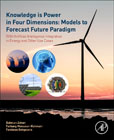
Knowledge is Power in Four Dimensions: Models to Forecast Future Paradigm
Zohuri, Bahman
Rahmani, Farhang Mossavar
Behgounia, Farahnaz
Knowledge is Power in Four Dimensions: Models to Forecast Future Paradigms, Forecasting Energy for Tomorrow's World with Mathematical Modeling and Python Programming Driven Artificial Intelligence delivers knowledge on key infrastructure topics in both AI technology and energy. Sections lay the groundwork for tomorrow's computing functionality, starting with how to build a Business Resilience System (BRS), data warehousing, data management, and fuzzy logic. Subsequent chapters dive into the impact of energy on economic development and the environment and mathematical modeling, including energy forecasting and engineering statistics. Energy examples are included for application and learning opportunities. A final section deliver the most advanced content on artificial intelligence with the integration of machine learning and deep learning as a tool to forecast and make energy predictions. The reference covers many introductory programming tools, such as Python, Scikit, TensorFlow and Kera. Helps users gain fundamental knowledge in technology infrastructure, including AI, machine learning and fuzzy logic Compartmentalizes data knowledge into near-term and long-term forecasting models, with examples involving both renewable and non-renewable energy outcomes Advances climate resiliency and helps readers build a business resiliency system for assets INDICE: Part I: Infrastructure Concepts 1. Knowledge is Power 2. A General Approach to Business Resilience System (BRS) 3. Data Warehousing, Data Mining, Data Modeling, and Data Analytics 4. Structured and Unstructured Data Processing 5. Mathematical Modeling Driven Predication 6. Fuzzy Logics: A New Method of Predictions 7. Neural Network Concept 8. Population - Human Growth Driving Ecology 9. Economic Factors 10. Risk Management, Risk Assessment, and Risk Analysis 11. Today's Fast-Paced Technology Part II: The Impact of Energy on Tomorrow's World 12. Understanding of Energy 13. Economic Impact of Energy 14. Renewable Energy 15. Non-Renewable Energy 16. Nuclear Energy as Non-Renewable Energy Source 17. Energy Storage Technologies and their Role in Renewable Integration Part III: The Mathematical Approach and Modeling 18. Predictive Analytics 19. Engineering Statistics 20. Data and Data Collection Driven Information 21. Statistical Forecasting - Regression and Time Series Analysis 22. Introduction to Forecasting: The Simplest Models 23. Notes on Linear Regression Analysis 24. Principles and Risks of Forecasting 25. Artificial Intelligence Driving Predictive and Forecasting Paradigm Part IV: Python Programming Driven Artificial Intelligence 26. Python Programming Driven Artificial Intelligence 27. Artificial Intelligence, Machine Learning and Deep Learning Driving Big Data 28. Artificial Intelligence, Machine Learning and Deep Learning Use Cases
- ISBN: 978-0-323-95112-8
- Editorial: Academic Press
- Encuadernacion: Rústica
- Páginas: 800
- Fecha Publicación: 01/06/2022
- Nº Volúmenes: 1
- Idioma: Inglés
